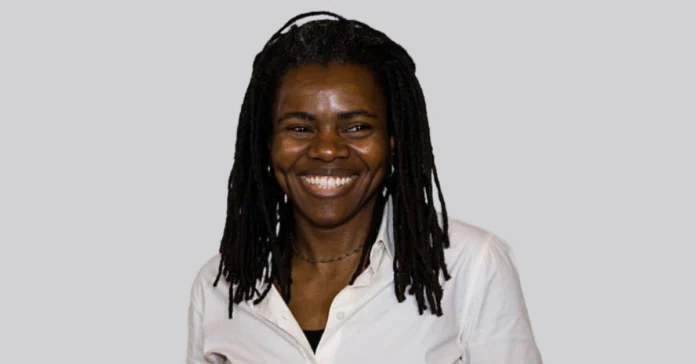Aneta Chapman remains largely unknown to the public despite her significant contributions to social work and community development in Cleveland and beyond.
While her younger sister Tracy Chapman gained worldwide fame with hits like “Fast Car” and “Give Me One Reason,” Aneta dedicated her life to creating meaningful change through direct community service and social justice advocacy.
Her story offers a compelling contrast to celebrity culture, highlighting the impact of those who choose to work quietly behind the scenes for social good.
Early Life and Background in Cleveland
Born and raised in a predominantly Black working-class neighborhood on Cleveland’s East Side, Aneta experienced firsthand the challenges facing underserved communities that would later inform her professional choices and commitment to social change.
She grew up with her younger sister Tracy under the care of their mother, Hazel Chapman, who worked multiple low-paying jobs to support her daughters.
The family faced significant financial hardships after their parents separated when Tracy was four years old, with Hazel refusing alimony and sometimes relying on welfare while instilling strong values of independence and resilience in her daughters.
Her early experiences in Cleveland shaped her understanding of systemic inequality and the need for dedicated community support systems to help families like her own.
Education and Professional Development
Aneta pursued higher education in fields related to social work and community service, deliberately choosing academic pathways that would equip her with the skills to address the social inequities she witnessed growing up in Cleveland.
Unlike many siblings of famous personalities who leverage family connections for personal advancement, Aneta built her professional identity independently, focusing on developing expertise in supporting underprivileged communities and creating sustainable pathways for social mobility and justice.
Her educational background provided the foundation for a career dedicated to addressing root causes of inequality rather than just treating symptoms.
Current Professional Work (2025)
Aneta works as a professional social worker focused on community development initiatives.
Through her current role, she continues addressing systemic barriers facing underserved communities, building upon decades of experience working with vulnerable populations to create more equitable access to resources, opportunities, and social support systems.
In 2025, Aneta will maintain her commitment to social justice advocacy while developing innovative approaches to community empowerment that recognize the changing social landscape and emerging needs within the populations she serves.
Her work exemplifies how consistent, behind-the-scenes effort can create meaningful change that transforms individual lives and entire communities over time.
Philanthropic Initiatives and Community Impact
Beyond her professional responsibilities, Aneta actively engages in philanthropic work that aligns with her commitment to social justice, dedicating personal time and resources to initiatives that may not receive mainstream attention but address critical needs in underserved communities.
Her philanthropic approach emphasizes direct community engagement rather than high-profile charity events.
While specific organizations and initiatives remain largely unpublicized due to her private nature, sources close to Aneta indicate her focus areas include educational access, housing stability, and mental health support for vulnerable populations.
Relationship with Tracy Chapman: A Unique Sibling Bond
The Chapman sisters share a profound bond despite their divergent life paths.
Tracy Chapman’s debut self-titled album was dedicated to Aneta, indicating the significant role her elder sister played in supporting her musical journey even as Aneta pursued her calling in social service and community development work.
Their childhood in Cleveland fostered a creative environment where they supported each other’s interests and developed the values that would guide their adult lives.
In 2025, Aneta continues to serve as a grounding influence for Tracy, providing personal encouragement and behind-the-scenes support during Tracy’s occasional returns to the public eye while maintaining her commitment to privacy.
Privacy vs. Fame: Aneta’s Deliberate Life Choices
Unlike her famous sister, Aneta has deliberately chosen a life away from public scrutiny, focusing her energy on direct service rather than public recognition.
This commitment to privacy reflects a fundamental value shared by both Chapman sisters: the belief that one’s work and character should speak louder than publicity or fame, with Aneta embodying this principle through her consistent dedication to community service rather than seeking the spotlight.
While Tracy Chapman has used her platform and music to advocate for social justice on a global scale, Aneta has chosen a different but equally meaningful path of creating change through direct engagement with communities and individuals most affected by social inequality.
Aneta Chapman’s Legacy and Ongoing Impact in 2025
As of 2025, Aneta’s influence extends beyond direct service work to include mentoring younger social workers and community advocates who seek to follow her example of meaningful, sustained community engagement.
Her legacy grows quietly but significantly.
Though she may never achieve the global recognition of her sister Tracy, Aneta Chapman’s contributions to social justice and community development represent an equally valuable form of artistic expression – one that shapes lives and communities rather than platinum records.
Resources and Ways to Support Similar Causes
For those inspired by Aneta commitment to social justice and community development, numerous organizations in Cleveland and nationwide offer opportunities to engage in similar work through volunteering, donations, or career paths in social services and community organizing.
Community development organizations like those Aneta Chapman supports often seek volunteers and donations to expand their impact in underserved neighborhoods, providing both monetary and time-based ways to contribute to similar social justice initiatives.
Organizations focusing on educational equity, affordable housing, and mental health support—all areas aligned with Aneta Chapman’s professional focus—can be found in most communities and offer entry points for those inspired by her dedication to creating sustainable change.
The National Association of Social Workers provides resources for those interested in pursuing professional paths similar to Aneta Chapman’s career, including educational requirements, certification information, and networking opportunities within the field of social work and community development.
Supporting grassroots organizations addressing systemic inequality offers perhaps the closest alignment with Aneta Chapman’s approach to social change—prioritizing local knowledge, community leadership, and sustainable solutions over high-profile but temporary interventions.
Conclusion
Aneta Chapman’s story serves as a powerful reminder that meaningful social change often happens through consistent, dedicated work outside the public eye, challenging our celebrity-focused culture to recognize different forms of significance and success.
While her sister’s songs have become anthems for social justice, Aneta has chosen to embody those values through direct action, demonstrating that there are multiple paths to creating meaningful change in a world that desperately needs both voices and hands in service.
To learn more about community champions like Aneta Chapman or contribute to social justice initiatives in your area, join our eMagazineMix community newsletter today and become part of the change!









